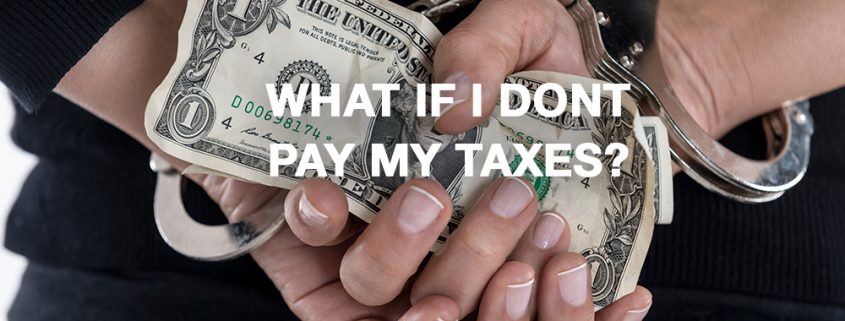Beware: Failing To Pay The IRS Could Land You In Jail
Beware: Failing To Pay The IRS Could Land You In Jail
The IRS is notorious for taking aggressive collection action including filing tax liens, issuing wage garnishments, seizing assets and levying bank accounts in order to collect outstanding IRS debt. In some cases the IRS is also looking to make an example of what happens to taxpayers who do not cooperate in paying their taxes or even worse not filing tax returns.
Owner Of Colorado Business Sentenced To Prison For Tax Crimes.
In a press release issued by the U.S. Attorney’s Office in Colorado, Douglas A. Wieland, a Colorado paving company owner, was sentenced to prison for failure to pay income taxes. Mr. Wieland was sentenced to 12 months and one day in prison by U.S. District Judge R. Brooke Jackson in Denver, Colorado. In September 2018, Mr. Wieland pleaded guilty to two counts of failure to pay income taxes, in violation of 26 U.S.C. § 7203.
According to court documents, Mr. Wieland owned and operated Performance Paving, a company that performed asphalt and concrete work. Mr. Wieland admitted that, from April 1999 through December 2017, he did not make any payments toward his income taxes. He also admitted that he took steps to conceal his income and assets to prevent the IRS from seizing his assets. He deposited over $1.8 million into a “warehouse bank” account and then used that account to pay for his personal expenses. The purpose of a “warehouse bank” is to maintain the financial privacy of all “account holders” by commingling the funds of numerous account holders in a single bank account, usually at a domestic bank in the United States. Mr. Wieland also cashed checks his customers gave him for his services, and admitted at a court proceeding held in Adams County, Colorado, that he “cashed a check somewhere outside the box so the IRS doesn’t steal it from my bank”.
In addition to the term of imprisonment imposed, Mr. Wieland was ordered to pay restitution in the amount of $166,658.
Mr. Wieland should also expect that after serving his sentence he will be dealing with the Civil Division of the IRS who will be interested in conducting a full scale civil audit.
Penalties For Failure To File A Tax Return or Filing A False Income Tax Return or Under-reporting Income.
Failure to report all the money you make is a main reason folks end up facing an IRS auditor. Carelessness on your tax return might get you whacked with a 20% penalty. But that’s nothing compared to the 75% civil penalty for willful tax fraud and possibly facing criminal charges of tax evasion that if convicted could land you in jail.
Criminal Fraud – The law defines that any person who willfully attempts in any manner to evade or defeat any tax under the Internal Revenue Code or the payment thereof is, in addition to other penalties provided by law, guilty of a felony and, upon conviction thereof, can be fined not more than $100,000 ($500,000 in the case of a corporation), or imprisoned not more than five years, or both, together with the costs of prosecution (Code Sec. 7201).
Willful Failure To File – The law defines that any person who willfully fails to file a tax return as required by the Internal Revenue Code is, in addition to other penalties provided by law, guilty of a felony and, upon conviction thereof, can be fined not more than $25,000 ($100,000 in the case of a corporation), or imprisoned not more than five years, or both, together with the costs of prosecution (Code Sec. 7203).
The term “willfully” has been interpreted to require a specific intent to violate the law (U.S. v. Pomponio, 429 U.S. 10 (1976)). The term “willfulness” is defined as the voluntary, intentional violation of a known legal duty (Cheek v. U.S., 498 U.S. 192 (1991)).
And even if the IRS is not looking to put you in jail, they will be looking to hit you with a big tax bill with hefty penalties.
Civil Fraud – Normally the IRS will impose a negligence penalty of 20% of the underpayment of tax (Code Sec. 6662(b)(1) and 6662(b)(2)) but violations of the Internal Revenue Code with the intent to evade income taxes may result in a civil fraud penalty. In lieu of the 20% negligence penalty, the civil fraud penalty is 75% of the underpayment of tax (Code Sec. 6663). The imposition of the Civil Fraud Penalty essentially doubles your liability to the IRS!
What Should You Do?
You know that at the Law Offices Of Jeffrey B. Kahn, P.C. we are always thinking of ways that our clients can save on taxes. If you are selected for an audit, stand up to the IRS by getting representation. Tax problems are usually a serious matter and must be handled appropriately so it’s important to that you’ve hired the best lawyer for your particular situation. The tax attorneys at the Law Offices Of Jeffrey B. Kahn, P.C. located in Orange County (Irvine), Metropolitan Los Angeles (Long Beach and Ontario) and elsewhere in California are highly skilled in handling tax matters and can effectively represent at all levels with the IRS and State Tax Agencies including criminal tax investigations and attempted prosecutions, undisclosed foreign bank accounts and other foreign assets, and unreported foreign income. Also if you are involved in cannabis, check out what our cannabis tax attorneys can do for you.


 Follow
Follow Follow
Follow
